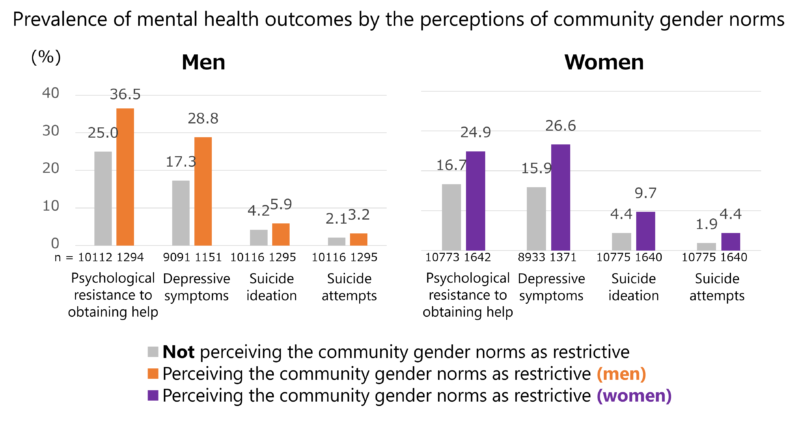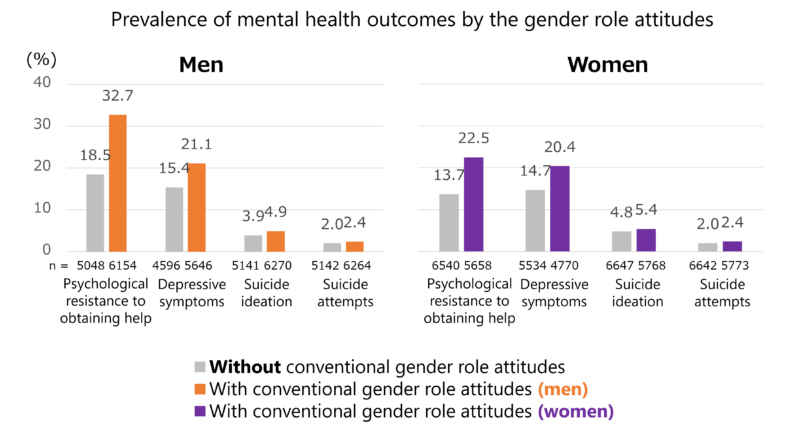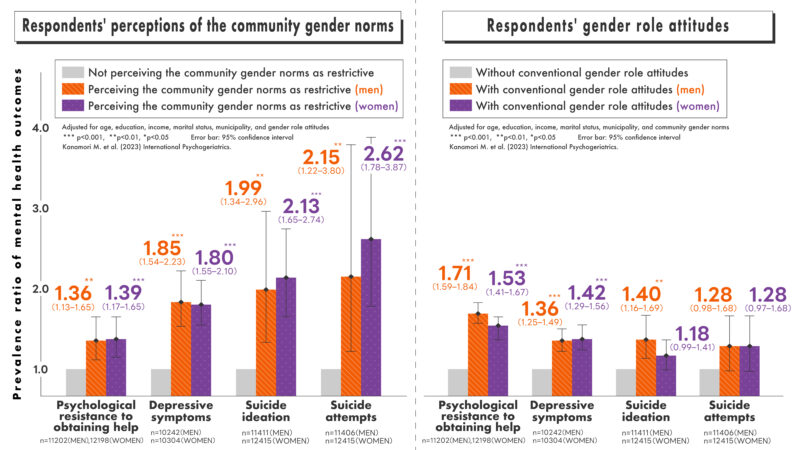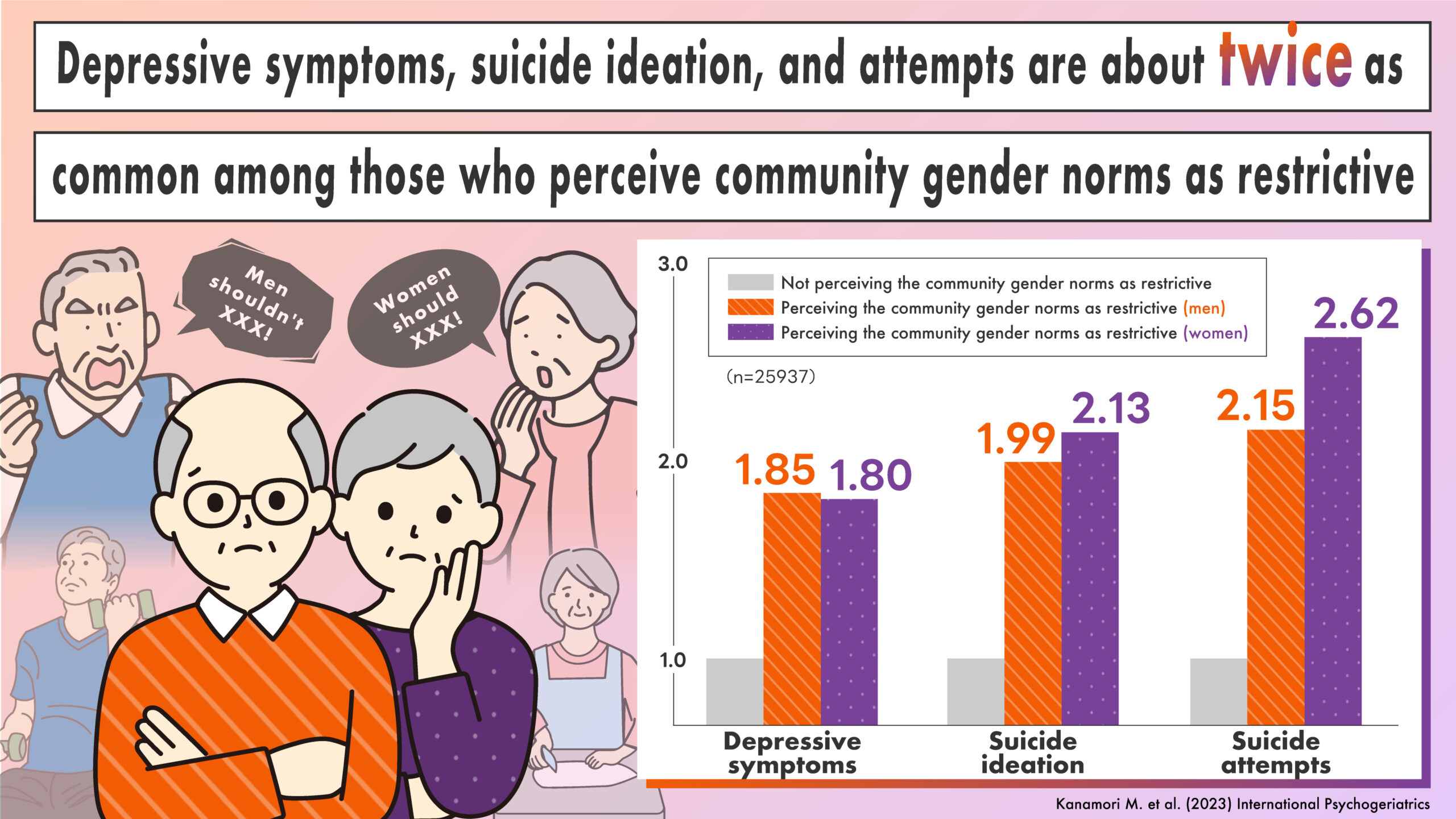Depressive symptoms, suicide ideation and attempts are about twice as common among those who perceive community gender norms as restrictive
“You should/should not do XXX, because you are a man/woman”
In an atmosphere that discriminates between men and women,
people may not be able to ask for help even if they want to
We examined the impact of perceived community gender norms, such as “You are a man/woman, you shouldn’t/shouldn’t do XXX”, on the mental health of older people. We analyzed cross-sectional data from 25,937 older adults. The results showed that men who perceived the gender norms of the community they lived in as restrictive were 1.9 times more likely to have depressive symptoms, 2.0 times more likely to have suicidal thoughts and 2.2 times more likely to have attempted suicide. Similarly, women were 1.8 times more likely to have depressive symptoms, 2.1 times more likely to have suicidal thoughts and 2.6 times more likely to have attempted suicide. Furthermore, among those who did not hold conventional gender role attitudes such as “it is a man’s role to work outside the home” and “it is a woman’s role to raise children and look after the home” there was a significant association between restrictive gender norms in the community and poorer mental health. It is possible that those who perceive the atmosphere in their community as being rigid about gender roles and think that it does not allow for diversity are less likely to seek help in times of need, which in turn has a negative impact on their mental health.
Objectives
Studies have shown that conformity to masculine norms, such as “men should be strong and not cry”, puts men at risk for suicide and depression. However, little attention has been paid to how “community gender norms”, such as the use of gendered language (“men/women should/shouldn’t XXX”) by local people, affect the mental health of men and women. If residents feel that the community has strict gender norms that do not allow for diversity, they may not be able to seek help even if they want to, because they may think that any behavior outside these norms is unacceptable to those around them. Also, previous research has generally focused on younger generations and rarely examined the impact of gender norms on the mental health of older adults. We therefore examined how community gender norms are associated with older adults’ depressive symptoms, suicidal ideation, history of suicide attempts, and psychological resistance to obtaining help (being embarrassed to talk to someone or ask for help when you have a problem or feel stressed).
Methods
We analyzed data from 25,937 older adults aged 65 and above living in 61 municipalities across Japan who participated in the Japan Gerontological Evaluation Study survey in 2019. When asked, “Do you think people in your area often use language that creates distinctions between men and women, like ‘You should/should not do XXX, because you are a man/woman?’ those who answered “I think so” or “I somewhat think so” to the question were scored as perceiving the community gender norms as restrictive. Responses to the three statements (1)“If mothers have jobs, it will have a negative impact on their children before they enter elementary school” (2) “It is primarily a man’s role to work outside the home” (3) “It is primarily a woman’s role to raise children and look after the home” were used to divide respondents into two groups: those with conventional gender role attitudes and those without such attitudes. Regression analysis was performed, adjusting for age, marital status, residential municipality, educational background, and household income.
Results
For both men and women, those who perceived the community gender norms as restrictive were more likely than those who did not to have depressive symptoms, suicidal ideation, a history of suicide attempts, and to have greater psychological resistance to obtaining help. Similar associations were found in the group with conservative gender role attitudes (see below cross-tabulation).


In an analysis that adjusted for individual characteristics and respondents’ own gender role attitudes, men who perceived the community gender norms as restrictive were 1.9 times more likely to have depressive symptoms, 2.0 times more likely to have suicidal ideation, and 2.2 times more likely to have a history of suicide attempts. Similarly, women were 1.8 times more likely to have depressive symptoms, 2.1 times more likely to have suicidal ideation, and 2.6 times more likely to have a history of suicide attempts. Both men and women were 1.4 times more likely to experience psychological resistance to obtaining help. Furthermore, among those whose own gender role attitudes were not conventional, there was a significant association between restrictive gender norms in the community and poorer mental health (statistically significant for suicidal ideation in men: p=0.046).

Conclusions
Our results suggest that perceptions of restrictive gender norms in the community may have a negative impact on the mental health of older adults. The use of gendered language such as “men/women should/shouldn’t XXX” may not necessarily be intended to be offensive by the speaker, nor is it necessarily directed at that person. However, by perceiving the people around them as conventional in their thinking, individuals may be limiting their own options in various ways, e.g., “Even if I ask for help, I may not be accepted by the people around me”. In particular, some older people in Japan have experienced significant changes in their attitudes toward gender over the course of their lives. They may hide their feelings from friends and neighbors for fear of being ostracized, which can lead to poor mental health.
Significance of this study
This is the first study to suggest a possible new mechanism for the impact of gender norms on suicide and mental health. Both men and women, regardless of whether they themselves hold conventional gender role attitudes, suggested that simply feeling that people in the community in which they live hold restrictive gender norms may have a negative impact on their mental health. More research is needed, but the findings suggest that broad SDH (social determinants of health) approaches, such as improving gender equality, may also be effective for mental health.
Publication information
Kanamori M., Stickley A., Takemura K., Kobayashi Y., Oka M., Ojima T., Kondo K., Kondo N. (2023). Community gender norms, mental health and suicide ideation and attempts among older Japanese adults: a cross-sectional study. International Psychogeriatrics, 1-11. https://doi.org/10.1017/S104161022300087X
Acknowledgments
This research was supported by the JSPS Grant-in-Aid for Scientific Research, the Ministry of Health, Labour and Welfare, the Japan Agency for Medical Research and Development (AMED), the National Center for Geriatrics and Gerontology, and other sources. This study used the data from the Japan Gerontological Evaluation Study. We would like to express our deepest gratitude to all of them.
*This paper was featured by the following commentary.
Lutz J, Beaudreau SA, Rosenfeld EA. Identifying the influences of aging, generations, and cohorts on gender norms and suicide risk in late life. International Psychogeriatrics. Published online 2023:1-6. https://doi.org/10.1017/S1041610223004441



コメント